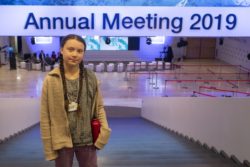Environmental Security and Existential Risk
POLIS and CGSC are striving to become a world-leading place for the study of environmental security and existential risk, in particular in relation to the global challenge of climate change.
Reflecting this ambition, two new professors – Head of School Prof Richard Beardsworth (formerly Aberystwyth) and Prof Olaf Corry (formerly Copenhagen) have bolstered the Centre’s existing expertise on environmental security. These exciting appointments join Leeds’ existing experts working on environmental security, including Associate Professors Viktoria Spaiser, Hugh Dyer, Markus Fraundorfer and Emma Anderson, and Professor Anna Mdee. This research theme is led by Professor Olaf Corry.
CGSC has research collaborations with Lancaster Environment Centre and the University of Copenhagen; University of Cambridge’s Centre for the Study of Existential Risk; University of Glasgow and University of Arizona. And the Centre is expanding its intellectual and degree design collaborations with researchers from The Priestley Centre.
Climate and Security
Leeds aims to be a leader in the emerging politics of climate security.

Highlight: Prof Richard Beardsworth was the University's co-lead at COP26. This 20-strong team included CGCS colleagues, Drs Spaiser and Nisbett.
Highlight: Prof Olaf Corry’s research focuses the international politics of climate change, especially the security implications of climate engineering technologies. He is currently working on the implications of climate engineering technologies for international politics and leads the iSPACE project (International Security Politics and Climate Engineering) – with Professor Duncan McLaren, University of Lancaster (funded by the Independent Research Fund Denmark). iSPACE is interdisciplinary, situating STEM-knowledges with International Relations, Ethics and Science and Technology Studies. Together they are currently collaborating with researchers from Sweden, the United States and Germany to bring together researchers working on security risks and geoengineering.
The impact agenda is to help provide a more holistic evidence-base for the IPCC’s future assessments of climate engineering. Key outputs include peer reviewed articles in Global Policy and WIREs Climate Change, a series of op-ed articles, a unique set of illustrations of the world politics of climate engineering technology.
Highlight: In September 2022, Dr. Danielle Young joined the CGSC as UKRI Postdoctoral Fellow (Horizon Europe Guarantee Scheme for Marie Sklodowska Curie Postdoctoral Fellowship). Danielle's project, in collaboration with Dr. Laura Considine and Prof. Olaf Corry, explores the parallels between the emerging governance of solar geoengineering and nuclear weapons governance.
The increasingly visible consequences of climate change are leading scientists and policymakers to consider the extreme measure of trying to cool global temperatures by spraying reflective particles into the stratosphere to partially block out incoming solar radiation, a proposed technology called Stratospheric Aerosol Injection (SAI). If the technology is to be safely developed and used, it will require extensive international cooperation to govern. Proponents use the governance of nuclear weapons as an analogy for how solar geoengineering governance can work but often in a superficial way that assumes states are rational and do not substantially engage with the historical realities and shortcomings of nuclear governance. Danielle’s work focuses on providing a more in-depth, historically situated analysis of the development and current state of nuclear governance to shed light on the challenges that policymakers and researchers face in trying to govern solar geoengineering technologies.
Climate and governance
CGSC aims to be a leading centre for the study of global climate governance.

Highlight: Dr. Viktoria Spaiser focuses on rapid, fair and empowering transition to zero-emissions / zero-pollution using mathematical and computational approaches. Her research is funded by a UKRI Future Leaders Fellowship. She is also the Deputy Director of Civil Society, Development and Democracy (CDD) pathway of the ESRC funded White Rose Doctoral Training Partnership examining how systems and institutions of governance – in both the richer and poorer parts of the world – are evolving in amidst contestation and crisis, including as a consequence of climate change.
Highlight: CGSC is seeking to lead in the development of effective climate governance. Prof Richard Beardsworth and Dr Hugh Dyer study global climate governance, while Associate Professor Markus Fraundorfer is currently working on a book on governance under ‘Anthropocene’ conditions of dramatic environmental change. Olaf Corry works on the global governance of emerging climate technologies. And Professor Jason Ralph is currently writing a new monograph on pragmatism, as it relates to global governance and climate change.
Environmental violence
Leeds is becoming a leading place for studying political violence and the environment.
Highlight: Prof Ted Newman’s work is famous for its contributions in human security. His current research on conflict relates to debates about the role of climate and the environment in triggering or sustaining international conflicts. He has written on food riots and pursued international, interdisciplinary collaborations of fuel riots. His recent collaboration, with Professor Anna Mdee, explores the dynamics of political conflict in the Lake Chad region.

Recent developments: Olaf Corry has recently collaborated with an anthropologist from The School of Oriental and African Studies to examine how settler colonial movements violently target indigenous nature, transforming environments in their aim to become indigenous themselves.
The Climate Emergency
ISPACE
The Priestley Centre
Climate change and its impact on society and ecosystems is a global challenge and the centre aims to provide international solutions to the problems. Effective policy and solutions need to be underpinned by robust research and the Priestley Centre’s focus is on new interdisciplinary research partnerships that better link our physical, technological, economic and social understanding of climate change with strategies for mitigation and adaptation.
The Priestley International Centre for Climate is one of the University’s flagship strategic investments (of over £10m) in response to the global challenge of climate change. It launched formally on 14 June 2016 and in 2018 we moved into our own dedicated space in the Priestley Building on the University of Leeds campus.
